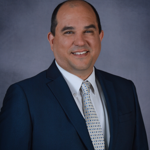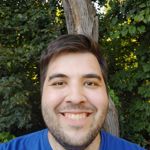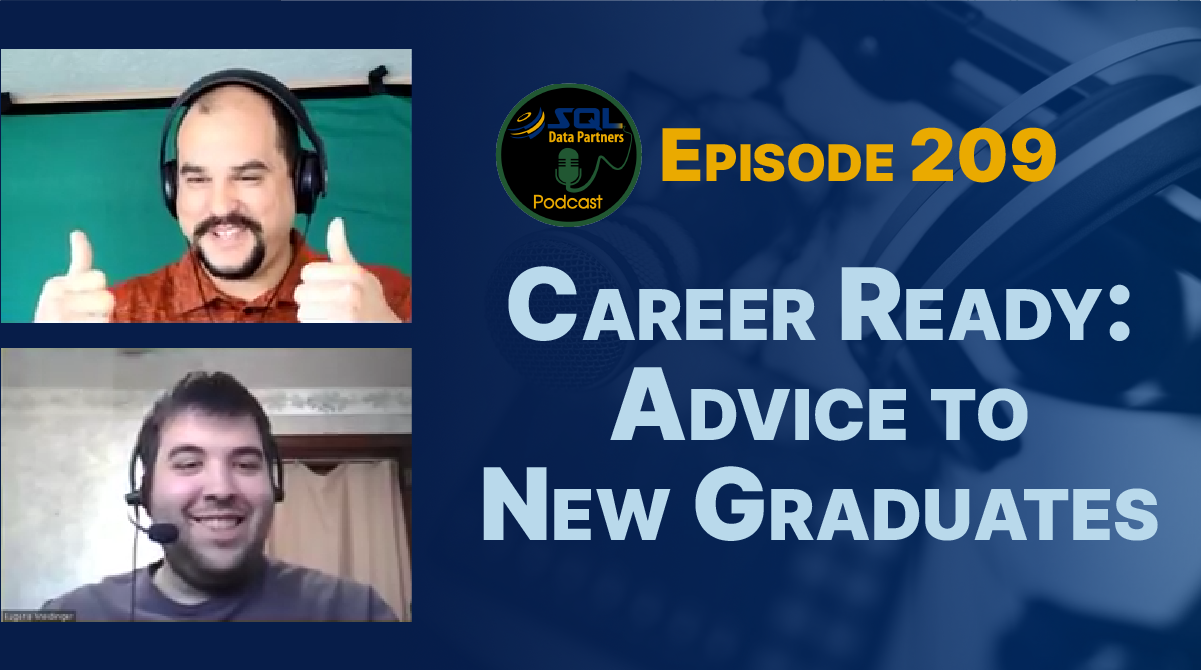Career Ready: Advice to New Graduates
Finding your first full time job is incredibly difficult—and that was before we were in a worldwide pandemic. In this episode, we discuss some strategy—and share some experiences about how we got our first jobs and hopefully give you some inspiration as you try to find your first experience.
Your first job will have its own unique journey. It may take some time—and that is ok.
It took me almost 5 months to get my first job after I graduated college—and that was a part-time position! While easier said than done, don’t sweat it if you don’t have a job lined up by the time you walk across the podium—or the Zoom conference.
Times are different than when your parents graduated or even last year’s graduating class. Yes, others may be landing jobs. You can’t have that one. Keep going.
What you do want to be concerned about is the number of conversations you are having.
Be as specific as you can when asking for help.
The biggest issue I see with new graduates is when they ask me for help they ask for me to solve their job problem. I need a job, they say. I get that—really, I do; however, this is a big ask. McDonald’s is hiring I say. They just stare at me. What? I thought you needed a job. Oh, not that kind of job.
I know you, as a recent graduate, don’t know where you will find your job; however, as you have conversations with others, see if they can connect you to your next conversation. Unless they have actually posted a job, the chance they have a job for you is pretty low, but they may be able to connect you with someone else who can help you to the next step on your path. To help them help you, get specific. Do you have a vertical you are looking for (transportation, non-profit, consulting, etc), or perhaps a specific company (Microsoft, Harley Davidson, Save the Wales) you want to join?
Instead of asking for a job, ask them if they know someone who can connect you at company X or vertical Y. They will be MUCH more likely to be able to assist you and the ask is much smaller—more direct. Remember, people generally want to help and if you can make your ask more approachable, both of you then get something out of the exchange. The classic win-win.
Your learning journey will not end with your degree.
You have probably learned quite a bit in school—that is great. Take what you know and apply it in your new position, but don’t be quick to take a my-way-or-the-highway approach. Most folks are open to making things better, but no one likes to be told they are doing it wrong. Seek to understand why things are done in a certain way before you attempt to solicit change. This may be your approach to social media, but you don’t have to sit in meetings or work on projects with social media folks. You WILL have to continue to interact with your co-workers.
You’ve chosen to work in the technology field. Learning will always be part of your experience and in the beginning, much of that learning will come from co-workers.
Below you can watch our longer discussion in the YouTube video. Take a peek and let us know what you think.
You’re going to graduate [from college] and all of a sudden, ‘my life is complete. I have had all of the education that I need…oh gosh.’” “It’s just the pinnacle.
Meet the Hosts

Carlos Chacon
With more than 10 years of working with SQL Server, Carlos helps businesses ensure their SQL Server environments meet their users’ expectations. He can provide insights on performance, migrations, and disaster recovery. He is also active in the SQL Server community and regularly speaks at user group meetings and conferences. He helps support the free database monitoring tool found at databasehealth.com and provides training through SQL Trail events.

Eugene Meidinger
Eugene works as an independent BI consultant and Pluralsight author, specializing in Power BI and the Azure Data Platform. He has been working with data for over 8 years and speaks regularly at user groups and conferences. He also helps run the GroupBy online conference.

Kevin Feasel
Kevin is a Microsoft Data Platform MVP and proprietor of Catallaxy Services, LLC, where he specializes in T-SQL development, machine learning, and pulling rabbits out of hats on demand. He is the lead contributor to Curated SQL, president of the Triangle Area SQL Server Users Group, and author of the books PolyBase Revealed (Apress, 2020) and Finding Ghosts in Your Data: Anomaly Detection Techniques with Examples in Python (Apress, 2022). A resident of Durham, North Carolina, he can be found cycling the trails along the triangle whenever the weather's nice enough.
Want to Submit Some Feedback?
Did we miss something or not quite get it right? Want to be a guest or suggest a guest/topic for the podcast?
